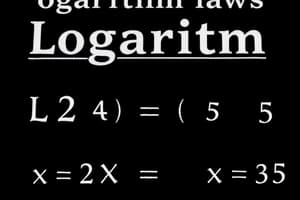Podcast
Questions and Answers
Which function is the inverse of exponentiation?
Which function is the inverse of exponentiation?
- Logarithm (correct)
- Addition
- Multiplication
- Differentiation
What is the logarithm base 10 of 1000?
What is the logarithm base 10 of 1000?
- 4
- 1
- 2
- 3 (correct)
What is the base of the natural logarithm?
What is the base of the natural logarithm?
- $\sqrt{2}$
- $\frac{1},{2}$
- $e$ (correct)
- $\pi$
Which logarithm is frequently used in computer science?
Which logarithm is frequently used in computer science?
Who introduced logarithms?
Who introduced logarithms?
Which logarithm is commonly used in science and engineering?
Which logarithm is commonly used in science and engineering?
What is the value of the natural logarithm base e?
What is the value of the natural logarithm base e?
Who introduced logarithms?
Who introduced logarithms?
What is the inverse function to exponentiation?
What is the inverse function to exponentiation?
Which logarithm uses base 2 and is frequently used in computer science?
Which logarithm uses base 2 and is frequently used in computer science?
Flashcards are hidden until you start studying
Study Notes
Inverses of Functions
- The inverse function of exponentiation is the logarithm.
Logarithmic Values
- The logarithm base 10 of 1000 is 3, as 10 raised to the power of 3 equals 1000.
Types of Logarithms
- The base of the natural logarithm is Euler's number, approximately 2.71828, denoted as e.
- The common logarithm used in science and engineering typically refers to logarithms with base 10.
Logarithms in Computer Science
- The logarithm frequently used in computer science is the logarithm base 2, denoted as log₂, which is significant in algorithms and complexity analysis.
Historical Context
- Logarithms were introduced by John Napier in the early 17th century.
- Logarithms simplify calculations, particularly multiplication and division, by converting them into addition and subtraction.
Additional Information
- The value of the natural logarithm base e, denoted as ln(e), is 1, since e raised to the power of 1 equals e.
Studying That Suits You
Use AI to generate personalized quizzes and flashcards to suit your learning preferences.



